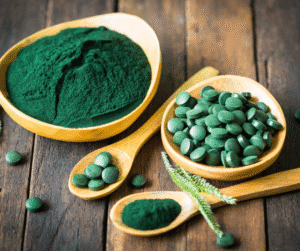Soy and Health: Science-Based Clarity Beyond the Myths

Soy is one of the most talked-about and misunderstood foods. Online, you’ll find everything from glowing endorsements to alarming warnings — particularly around hormones and cancer. Many people worry that soy may disrupt hormonal balance, especially due to its content of phytoestrogens (plant-based estrogen-like compounds). This article will clarify what current scientific research actually says about soy, focusing on both its proven health benefits and the valid concerns related to genetically modified organisms (GMOs) and pesticide use. Special emphasis is placed on the value of choosing organic soy to maximize safety and health outcomes.
Scientifically Proven Benefits of Soy
Cardiovascular Health
Numerous human trials and meta-analyses confirm:
- Cholesterol reduction: Soy protein helps lower total and LDL cholesterol, particularly in people with elevated levels. This cardiovascular benefit is a key reason soy is recommended for heart health.
👉 PubMed Study – Effect on lipid profile - Blood pressure support: Isoflavones in soy may improve arterial elasticity and help reduce blood pressure.
Cancer Prevention
Far from promoting cancer, soy consumption is associated with a reduced risk of several types of cancer:
- Breast, prostate, colorectal, and lung cancers: Regular soy intake is linked to a lower incidence of hormone-dependent and other cancers, especially in populations with life-long soy consumption – such as Asian communities.
👉 PubMed Review – Soy and cancer risk - Breast cancer survivors: Studies show that soy does not increase recurrence risk; in fact, it may improve outcomes and reduce mortality.
👉 PubMed – Women with breast cancer
Menopause and Bone Health
- Menopause symptom relief: Isoflavones from soy may alleviate hot flashes and other symptoms by gently modulating estrogenic activity.
👉 PubMed – Soy isoflavones and menopause - Bone support: Some studies suggest soy improves bone mineral density or slows bone loss, particularly in postmenopausal women.
Metabolic Health
- Type 2 diabetes: Observational studies and meta-analyses suggest an inverse relationship between soy intake and the risk of developing type 2 diabetes.
👉 PubMed – Soy and metabolic syndrome - Syndrome X (metabolic syndrome): Soy appears beneficial in managing blood sugar, triglycerides, and abdominal obesity.
Other Benefits
- Rich in plant-based protein: Complete protein source, ideal for vegan and vegetarian diets.
- Mood and cognition: Preliminary data suggest a possible role in mood support.
- Skin and kidney health: Soy components may improve skin hydration and support renal function.
Understanding Phytoestrogens and Hormonal Safety
What Are Phytoestrogens?
Isoflavones in soy (mainly genistein and daidzein) resemble estrogen structurally but have much weaker biological activity. They bind to estrogen receptors but act as modulators, not replacement hormones — far from behaving like pharmaceutical estrogens.
Hormonal Safety Summary
Concern | Current Scientific Findings |
Hormonal disruption | No evidence that soy causes hormonal imbalance in men or women. |
Feminization in men | Repeatedly debunked by human studies. Standard dietary intake does not alter testosterone or fertility levels. 👉 PubMed |
Breast cancer | Safe even for survivors. May actually reduce recurrence. |
Thyroid function | No harm in people with normal thyroid function. Those taking levothyroxine should separate timing of soy intake. 👉 PubMed |
Menopause management | Provides mild relief; useful alternative to hormone replacement therapy. |
During pregnancy/infancy | Use in moderation; infant soy formula appears safe but research is ongoing. 👉 PubMed |
Valid Concerns: GMO Soy and Pesticides
GMO Soy: What You Need to Know
Approximately 90% of the soy grown worldwide is genetically modified — primarily to resist herbicides like glyphosate. While EFSA and FDA consider GMO soy nutritionally equivalent to conventional soy, concerns remain.
Issue | Notes |
Herbicide resistance | Allows heavy chemical spraying without killing the crop. |
Pesticide residues | GMO soy often has significantly higher glyphosate residues than wild-type soy. |
Long-term health safety | Still under debate; evidence isn’t conclusive either way. |
Environmental impact | Monoculture; deforestation, biodiversity loss, and herbicide-resistant “superweeds.” |
Regulatory position (EU) | GMO cultivation banned; imported GM soy allowed for animal feed, with labeling required in foods. 👉 EFSA Overview |
Pesticide Use and Residues
Research demonstrates that:
- Glyphosate exposure in ultra-processed soy and animal feed may contaminate the overall food chain.
- Residues in food are regulated but vary by region. EU limits are stricter than in the US, but some imports still contain small, approved levels.
- Residue-free soy is more likely when sourcing organic or European-grown beans.
👉 PubMed – Review on glyphosate
GMO vs. Organic Soy – Comparison Table
Feature | Organic/Natural Soy | GMO/Conventional Soy |
Pesticide / herbicide use | None or minimal (prohibited in organic) | Frequent, especially glyphosate |
GMO content | Non-GMO by regulation | Typically genetically modified |
Residue risk | Very low or none | Significantly higher, especially in imports |
Environmental impact | Biodiverse, crop-rotation practices | High (monoculture, soil degradation, deforestation) |
Certified labeling | “Organic” or “GMO-free” seals available | May not be labeled clearly (especially feed use) |
Why Choose Organic Soy?
Choosing certified organic or GMO-free soy helps ensure:
- Minimal pesticide exposure
- Non-GMO origin
- Environmental sustainability
- Transparency via food labeling
Soy products such as tempeh, tofu, miso, and soymilk are widely available in organic grocery stores or labeled as “non-GMO”. Opting for these helps reduce both health and ecological risks.
Conclusion
In conclusion, soy is a safe and beneficial food when consumed in moderation, and its reputation for causing hormonal imbalance does not reflect what scientific research has shown. Instead, soy supports heart health, offers hormone-friendly benefits for menopausal women, aids in cancer prevention, and serves as a nutrient-dense plant protein.
However, the risks tied to industrial soy — primarily pesticide residues and genetic modification — are real concerns. Choosing organic or certified non-GMO soy is the most effective way to enjoy its benefits while avoiding environmental and chemical downsides.
As with most things in nutrition and health, the key is making informed, balanced, and high-quality choices.
References (PubMed Indexed)







